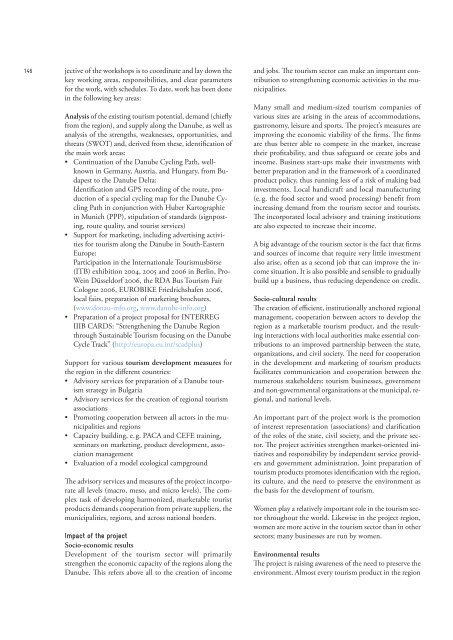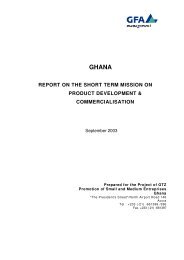Local/Regional Economic Development in South ... - Value Chains
Local/Regional Economic Development in South ... - Value Chains
Local/Regional Economic Development in South ... - Value Chains
Create successful ePaper yourself
Turn your PDF publications into a flip-book with our unique Google optimized e-Paper software.
1 6 jective of the workshops is to coord<strong>in</strong>ate and lay down the<br />
key work<strong>in</strong>g areas, responsibilities, and clear parameters<br />
for the work, with schedules. To date, work has been done<br />
<strong>in</strong> the follow<strong>in</strong>g key areas:<br />
Analysis of the exist<strong>in</strong>g tourism potential, demand (chiefly<br />
from the region), and supply along the Danube, as well as<br />
analysis of the strengths, weaknesses, opportunities, and<br />
threats (SWOT) and, derived from these, identification of<br />
the ma<strong>in</strong> work areas:<br />
• Cont<strong>in</strong>uation of the Danube Cycl<strong>in</strong>g Path, wellknown<br />
<strong>in</strong> Germany, Austria, and Hungary, from Budapest<br />
to the Danube Delta:<br />
Identification and GPS record<strong>in</strong>g of the route, production<br />
of a special cycl<strong>in</strong>g map for the Danube Cycl<strong>in</strong>g<br />
Path <strong>in</strong> conjunction with Huber Kartographie<br />
<strong>in</strong> Munich (PPP), stipulation of standards (signpost<strong>in</strong>g,<br />
route quality, and tourist services)<br />
• Support for market<strong>in</strong>g, <strong>in</strong>clud<strong>in</strong>g advertis<strong>in</strong>g activities<br />
for tourism along the Danube <strong>in</strong> <strong>South</strong>-Eastern<br />
Europe:<br />
Participation <strong>in</strong> the Internationale Tourismusbörse<br />
(ITB) exhibition 2004, 2005 and 2006 <strong>in</strong> Berl<strong>in</strong>, Pro-<br />
We<strong>in</strong> Düsseldorf 2006, the RDA Bus Tourism Fair<br />
Cologne 2006, EUROBIKE Friedrichshafen 2006,<br />
local fairs, preparation of market<strong>in</strong>g brochures,<br />
(www.donau-<strong>in</strong>fo.org, www.danube-<strong>in</strong>fo.org)<br />
• Preparation of a project proposal for INTERREG<br />
IIIB CARDS: “Strengthen<strong>in</strong>g the Danube Region<br />
through Susta<strong>in</strong>able Tourism focus<strong>in</strong>g on the Danube<br />
Cycle Track” (http://europa.eu.<strong>in</strong>t/scadplus)<br />
Support for various tourism development measures for<br />
the region <strong>in</strong> the different countries:<br />
• Advisory services for preparation of a Danube tourism<br />
strategy <strong>in</strong> Bulgaria<br />
• Advisory services for the creation of regional tourism<br />
associations<br />
• Promot<strong>in</strong>g cooperation between all actors <strong>in</strong> the municipalities<br />
and regions<br />
• Capacity build<strong>in</strong>g, e. g. PACA and CEFE tra<strong>in</strong><strong>in</strong>g,<br />
sem<strong>in</strong>ars on market<strong>in</strong>g, product development, association<br />
management<br />
• Evaluation of a model ecological campground<br />
The advisory services and measures of the project <strong>in</strong>corporate<br />
all levels (macro, meso, and micro levels). The complex<br />
task of develop<strong>in</strong>g harmonized, marketable tourist<br />
products demands cooperation from private suppliers, the<br />
municipalities, regions, and across national borders.<br />
Impact of the project<br />
Socio-economic results<br />
<strong>Development</strong> of the tourism sector will primarily<br />
strengthen the economic capacity of the regions along the<br />
Danube. This refers above all to the creation of <strong>in</strong>come<br />
and jobs. The tourism sector can make an important contribution<br />
to strengthen<strong>in</strong>g economic activities <strong>in</strong> the municipalities.<br />
Many small and medium-sized tourism companies of<br />
various sizes are aris<strong>in</strong>g <strong>in</strong> the areas of accommodations,<br />
gastronomy, leisure and sports. The project’s measures are<br />
improv<strong>in</strong>g the economic viability of the firms. The firms<br />
are thus better able to compete <strong>in</strong> the market, <strong>in</strong>crease<br />
their profitability, and thus safeguard or create jobs and<br />
<strong>in</strong>come. Bus<strong>in</strong>ess start-ups make their <strong>in</strong>vestments with<br />
better preparation and <strong>in</strong> the framework of a coord<strong>in</strong>ated<br />
product policy, thus runn<strong>in</strong>g less of a risk of mak<strong>in</strong>g bad<br />
<strong>in</strong>vestments. <strong>Local</strong> handicraft and local manufactur<strong>in</strong>g<br />
(e. g. the food sector and wood process<strong>in</strong>g) benefit from<br />
<strong>in</strong>creas<strong>in</strong>g demand from the tourism sector and tourists.<br />
The <strong>in</strong>corporated local advisory and tra<strong>in</strong><strong>in</strong>g <strong>in</strong>stitutions<br />
are also expected to <strong>in</strong>crease their <strong>in</strong>come.<br />
A big advantage of the tourism sector is the fact that firms<br />
and sources of <strong>in</strong>come that require very little <strong>in</strong>vestment<br />
also arise, often as a second job that can improve the <strong>in</strong>come<br />
situation. It is also possible and sensible to gradually<br />
build up a bus<strong>in</strong>ess, thus reduc<strong>in</strong>g dependence on credit.<br />
Socio-cultural results<br />
The creation of efficient, <strong>in</strong>stitutionally anchored regional<br />
management, cooperation between actors to develop the<br />
region as a marketable tourism product, and the result<strong>in</strong>g<br />
<strong>in</strong>teractions with local authorities make essential contributions<br />
to an improved partnership between the state,<br />
organizations, and civil society. The need for cooperation<br />
<strong>in</strong> the development and market<strong>in</strong>g of tourism products<br />
facilitates communication and cooperation between the<br />
numerous stakeholders: tourism bus<strong>in</strong>esses, government<br />
and non-governmental organizations at the municipal, regional,<br />
and national levels.<br />
An important part of the project work is the promotion<br />
of <strong>in</strong>terest representation (associations) and clarification<br />
of the roles of the state, civil society, and the private sector.<br />
The project activities strengthen market-oriented <strong>in</strong>itiatives<br />
and responsibility by <strong>in</strong>dependent service providers<br />
and government adm<strong>in</strong>istration. Jo<strong>in</strong>t preparation of<br />
tourism products promotes identification with the region,<br />
its culture, and the need to preserve the environment as<br />
the basis for the development of tourism.<br />
Women play a relatively important role <strong>in</strong> the tourism sector<br />
throughout the world. Likewise <strong>in</strong> the project region,<br />
women are more active <strong>in</strong> the tourism sector than <strong>in</strong> other<br />
sectors; many bus<strong>in</strong>esses are run by women.<br />
Environmental results<br />
The project is rais<strong>in</strong>g awareness of the need to preserve the<br />
environment. Almost every tourism product <strong>in</strong> the region



